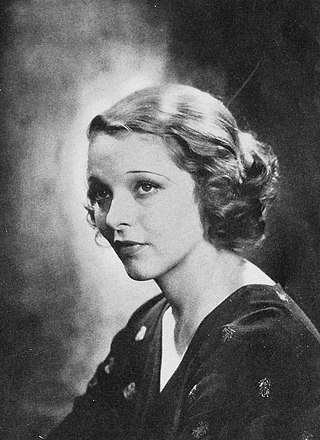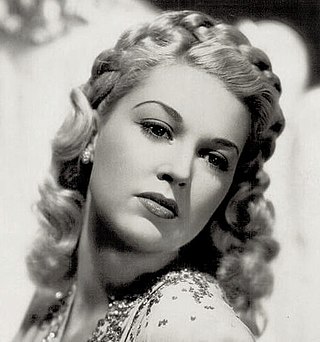
Joan Geraldine Bennett was an American stage, film, and television actress, one of three acting sisters from a show-business family. Beginning her career on the stage, Bennett appeared in more than 70 films from the era of silent films, well into the sound era. She is best remembered for her film noir femme fatale roles in director Fritz Lang's films—including Man Hunt (1941), The Woman in the Window (1944), and Scarlet Street (1945)—and for her television role as matriarch Elizabeth Collins Stoddard in the gothic 1960s soap opera Dark Shadows, for which she received an Emmy nomination in 1968.

Paper Dolls is an American primetime television soap opera that aired for 14 episodes on ABC from September 23 to December 25, 1984. Set in New York's fashion industry, the show centered on top modeling agency owner Racine, her conflicts with the family of cosmetics tycoon Grant Harper, and the careers of two teenaged models. The series was based on a 1982 television film of the same name. The show suffered in the ratings, despite positive reviews, and was cancelled midway through the first season.

Sally Blane was an American actress who appeared in more than 100 movies.

Julia Frances Newbern-Langford was an American singer and actress who was popular during the Golden Age of Radio and made film and television appearances for over two decades.

Dynasty: The Making of a Guilty Pleasure is a 2005 American made-for-television film based on the creation and behind the scenes production of the 1980s prime time soap opera Dynasty. It was broadcast on ABC on January 2, 2005.

Ellen Drew was an American film actress.

Born to Dance is a 1936 American musical film directed by Roy Del Ruth and starring Eleanor Powell, James Stewart and Virginia Bruce. It was produced and distributed by Metro-Goldwyn-Mayer. The score was composed by Cole Porter.

The Stud is a 1978 British drama film directed by Quentin Masters and starring Joan Collins and Oliver Tobias. It is based on the 1969 novel of the same name by Collins's younger sister Jackie Collins.

Joan Marsh was an American child actress in silent films between 1915 and 1921. Later, during the sound era, she resumed her acting career and performed in a variety of films during the 1930s and 1940s.

Time Out for Rhythm is a 1941 American musical comedy film directed by Sidney Salkow and starring Rudy Vallée, Ann Miller and the Three Stooges. It was based on the stage musical Show Business by Alex Ruben. Six Hits and a Miss perform, as well as Glen Gray and His Casa Loma Orchestra, and Eduardo Durant's Rhumba Band, and with eight original songs by Saul Chaplin and Sammy Cahn.

Joan Shawlee was an American film and television actress. She is known for her recurring role as Fiona "Pickles" Sorrell in The Dick Van Dyke Show, a career-defining turn in Billy Wilder's comedy Some Like It Hot (1959) playing Sweet Sue, the abrasive martinet in charge of Marilyn Monroe's all-girl jazz band, and as the flamboyant Madame Pompey in the 1957 Maverick episode "Stampede" with James Garner. She was sometimes credited under her birth name.

Dorothea Kent was an American film actress. She appeared in more than 40 films between 1935 and 1948. A former model, she often played dumb sidekicks of the heroine, and rarely played the lead. In addition to her credited roles, she also had roles in six other films, including her last role in the 1948 film The Babe Ruth Story.

Joan Elmer Woodbury was an American actress beginning in the 1930s and continuing well into the 1960s.

Get Yourself a College Girl, also released as The Swingin' Set, is a 1964 Metrocolor film comedy in the style of a beach party movie. The plot involves a college student who tries to balance her time writing songs and dealing with her publisher who tries to pursue her. It was directed by Sidney Miller and written by Robert E. Kent, and filmed at Sun Valley, Idaho, United States.

Tony Romano was an American jazz guitarist and singer. He performed on radio programs and in Hollywood musicals in the 1930s, 1940s, and 1950s. He became most noted as the sideman and musical accompanist to Bob Hope, Patty Thomas and Frances Langford during their USO tours in World War II, Korean, and Vietnam wars.

Stage Mother is a 1933 American pre-Code drama film directed by Charles Brabin and starring Alice Brady and Maureen O'Sullivan. The film is about a frustrated vaudeville performer who pushes her daughter into becoming a star dancer; selfishness, deceit and blackmail drive mother and daughter apart until a reconciliation at the end of the film. The screenplay was written by John Meehan and Bradford Ropes, based on the 1933 novel of the same name by Ropes.

Jungle Street, released in the US as Jungle Street Girls, is a 1961 black and white second feature British crime drama directed by Charles Saunders and starring David McCallum, Kenneth Cope, and Jill Ireland. The screenplay was by Alexander Doré from a story by Guido Coen.

Lorraine Krueger was an American actress. She appeared in the films New Faces of 1937, Everybody's Doing It, I'm From the City, Exposed, Idiot's Delight, The Farmer's Daughter, Golden Gloves, Dance, Girl, Dance, Model Wife, Hi, Buddy, He's My Guy, Sarong Girl, The Adventures of a Rookie, Career Girl, Slightly Terrific, Out of This World and One Exciting Week, among others.

Patty Thomas was an American dancer, USO entertainer and actress. She appeared in the 1961 film The Ladies Man, 1938 film You Can't Take It with You and toured with Bob Hope during and after World War II. Patty Thomas was born Patricia Thomas on August 1, 1922, in Erie, Pennsylvania. She also was in the films: Smooth Sailing, a 1947 short film by Jerry Hopper and the 2003 film Los no invitados. She died on March 29, 2014, in Newport Beach, California.



















